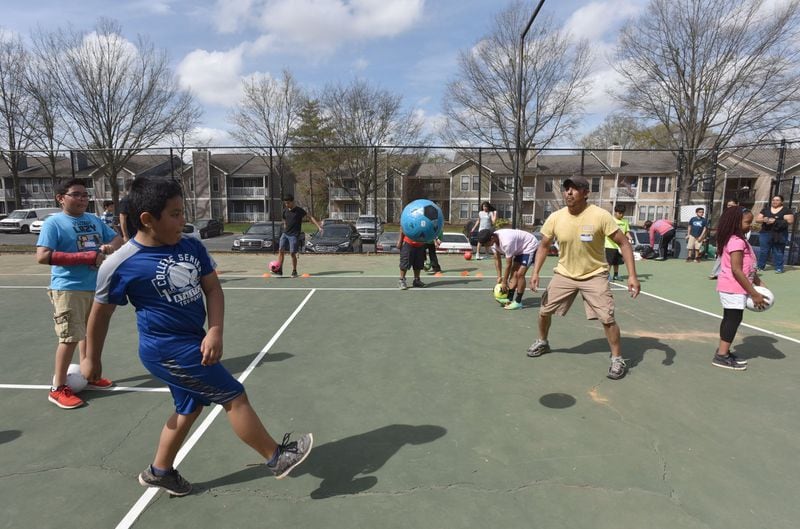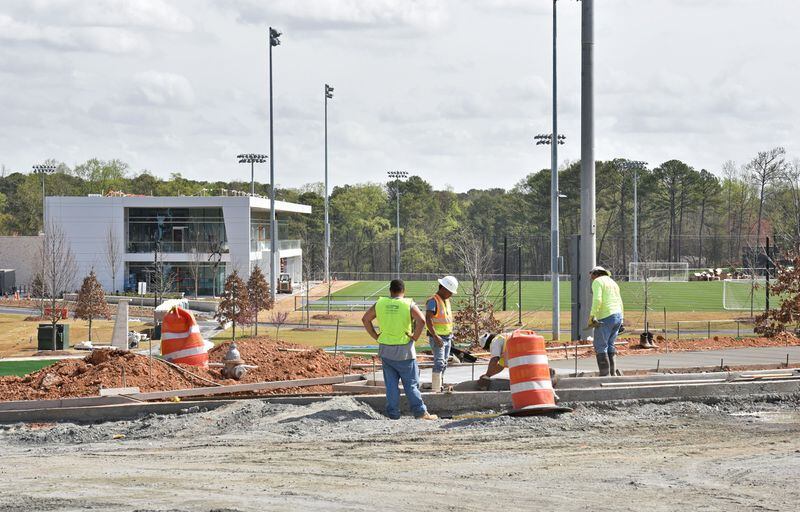On the newly renamed street Franklin Gateway in Marietta, children practiced their soccer skills — dribbling, passing and shooting — on a converted tennis court.
Across the street, workers labored to put the finishing touches on Atlanta United's new $60 million training complex. The soccer team, which donated balls, cones and goals for the children's practice, played its inaugural game to a sold out crowd at Bobby Dodd stadium on March 5. Soon, professional players will regularly come and go on these 32 acres owned by the city, which is constructing its own public fields nearby.
Atlanta United’s arrival has spurred excitement among residents who have lived through a decade of aggressive neighborhood revitalization efforts by the city. Locals say the corridor, once called Franklin Road, is safer and cleaner, that community-police relations have improved and after-school programs are flourishing.
But among renters, who make up the majority of residents, that enthusiasm is tempered by trepidation. They’ve seen neighbors displaced when the city bought and razed apartments that once stood where there’s fresh soccer turf. Landlords are renovating in anticipation of people moving in from other parts of the metro area, and rents are rising. Community members who say they worked with the city to make the revitalization a reality now fear they could be pushed out of the neighborhood they fought to save.
Bruce Nicklin, who owns 17 condominiums at St. Augustine Place that he rents out, said prices have gone up “drastically.”
“I used get on my knees with the rosary and pray for $800 a month,” Nicklin said. Now, he charges $1,050 and the “phone rings off the hook.”
Nicklin said everyone, renters and property owners, are safer. He acknowledged that some landlords may not renew leases for old residents. “They’re draining the pond and changing the alligators, so to speak,” Nicklin said.
Catherine Ross, director of the Center for Quality Growth and Regional Development at Georgia Tech, said redevelopment is always a “complex undertaking,” but metro Atlanta has led the country in transforming depressed areas with mixed-use, mixed-income projects.
“Change means just that: It doesn’t stay the same,” Ross said. “You have to net out what are those benefits, what are the costs, who’s benefiting and who’s paying the costs.”
Named for one of Marietta’s prominent families, Franklin Road in the 1970s and ’80s was known as the happening place for young professionals and students. They flocked to its many restaurants and clubs, like the famous Miss Kitty’s, which hosted musical acts from across the country.
Over the years, buildings changed hands and fell into disrepair. Cheap rents attracted tenants who were displaced when the city of Atlanta tore down its public housing and Hispanic immigrants who poured into the metro area for work during the 1990s construction boom. Unauthorized immigrants became targets for robberies by those who assumed they carried cash and were unlikely to seek out police. This concentration of poverty and vulnerability bred crime, law enforcement officials said.
Credit: Hyosub Shin
Credit: Hyosub Shin
By 2006, when the city won a U.S. Justice Department “Weed and Seed” grant for Franklin Road, the area of 10,000 had developed a reputation for violent crime. According to statistics provided by the Marietta Police Department, that year the area accounted for 21 percent of serious crime in the city. The crime rate has fluctuated since, but the most recent numbers available from 2015 show a reduction, with Franklin Gateway accounting for about 9 percent of serious crime.
“I’ll always remember my first time down there, when I took a look at Franklin Road,” said Marietta Police Chief Dan Flynn, recalling a seedy nightclub and boarded-up buildings. “You know what message that sends to the people that live in this community? The message that sends to them is, one, no one is in charge around here … and secondly, no one cares about this community.”
The Weed and Seed program was designed to “weed out” negative elements while “seeding” initiatives to revitalize an area.
Under the “weeding” column, Marietta Police set up traffic safety checkpoints that netted dozens of wanted suspects its first night. It began mapping and targeting the leaders in the drug trade with the help of federal agencies. Legislators designated Franklin Road a “Drug Free Zone,” doubling penalties for drug-related crimes. The department collaborated with the city to close down the troublesome nightclub and demolish blight. The grant also funded overtime to assign additional officers to Franklin Road.
On the “seeding” side, the department hired a community liaison, Daneea Badio-McCray, and held regular town hall meetings with residents. With their input, the city started early learning and after-school programs, as well as a Police Athletic League. Police initiated an outreach campaign to the Hispanic community, encouraging victims to report crimes, regardless of their immigration status.
Residents were vested in the turnaround, and conditions improved. They sat on and chaired committees, organized back-to-school events and held symposiums for youth and law enforcement.
But improvement brought its own problems.
Long-time resident Maria Corboda said her rent increased from $800 to $1,100 after the announcement that Atlanta United had decided to locate its facility in the area. Her family is looking for cheaper accommodation closeby so her son can continue to attend a local magnet school.
“Most of the people here I guess are hard workers,” Cordoba said. “We asked the city, ‘We need a park for Franklin Road.’ … But now we have the park, some place maybe the kids can go, but the people who asked for it, they’re gone because they can’t afford the price of the apartments.”
Related: Latest Cobb County News from AJC
Credit: Hyosub Shin
Credit: Hyosub Shin
Another resident, Tosha Freeman, is thrilled with the changes, recalling how the area used to be plagued by prostitution and drugs.
The Marietta Police Department “has cleaned up, and when I say cleaned up, I mean cleaned up,” Freeman said. “I feel safe that my kids can walk across the street. … Six years ago, you couldn’t do that.”
Freeman said her interactions with police have been overwhelmingly positive. As the mother of a black teenager, she feared a possible confrontation between officers and her rebellious 13-year-old son when he ran away. Instead, she said the officers reassured her that they would do whatever was needed to keep her son safe.
“That made me cry because I was expecting a whole different outcome,” she said.
Badio-McCray said the weed and seed program has been successful building fruitful relationships between residents, police and local businesses.
“Once you start providing basketball and swimming lessons and martial arts for people’s kids, you start to know the parents and they see ‘Oh, officers are pretty cool,’” she said.
Resident Melissa Wilson said she has mixed emotions about the redevelopment. Wilson settled on Franklin Road after struggling to find a landlord who would accept her section eight housing voucher. The Atlanta public housing complex where she had lived was sold to a developer.
The people who live in the area should be open to change and not “make it a bad thing,” she said. “But we don’t want to ever dismiss how some people felt when they did have to leave their homes.”
Between 2010 and 2016, the city bought and razed five apartment buildings using funds from a $68 million redevelopment bond issuance approved by voters. The city said the buildings were unsafe and troublesome — Marquis Place apartments caught fire twice in 2013. But some critics accused Marietta of waging “class warfare” to push out poor people and immigrants. Altogether, the city tore down about 1,000 units.
“It was very disruptive initially,” Badio-McCray acknowledged. “The reality was some of these properties needed to go, but emotionally I think it was difficult for a lot of residents.”
Georgia Tech’s Ross said it’s appropriate for taxpayers to ask questions about how the city might replace or preserve affordable housing as part of publicly funded redevelopment. Last year, the city of Atlanta passed an ordinance requiring residential developments that receive public funds to include a minimum percentage of affordable units. Marietta has no such policy.
Ross points to the Beltline as a successful example of redevelopment, despite concerns that the city is not living up to its pledge to ensure affordable housing.
Marietta City Councilman Philip Goldstein says the Franklin Gateway redevelopment, too, is a success.
In January 2016, the city approved a deal with Atlanta United for the team to build its practice complex on the land bought with redevelopment bonds. The team began practicing in March, with the complex slated for completion later this year. The city's public fields are scheduled to open in May.
“There is a lot of positive that has come from Atlanta United going there,” Goldstein said. “For those that didn’t believe Franklin Road could be something else, it has shown it can.”
Goldstein, who has represented the district that includes Franklin Gateway for more than 36 years, was circumspect when discussing the city’s role in preserving affordable housing as part of redevelopment.
“It’s basically a free market,” Goldstein said. “The success can be problematic in that regard, but the benefit is that you have a safer place.”
The Weed and Seed program ended in 2011, but its legacy survives in programs like the Police Athletic League, which is still active on Franklin Gateway, and the community organization Youth Empowerment Through Learning, Leading and Serving, or YELLS.
Miguel Enriquez, 16, was one of several YELLS teen mentors who organized the children’s soccer practice one recent Saturday, with the help of Atlanta United and Soccer in the Streets, an Atlanta-based nonprofit. He couldn’t be more excited about the team coming. And he’s noticed his neighborhood is safer in recent years.
“I see more and more kids out,” he said.
Atlanta United President Darren Eales said his team is looking forward to being a constructive partner.
“We want to be a catalyst,” he said. “Hopefully, we’re going to be an integral part of the fabric” of the community.
Related: Latest Atlanta United news from AJC








